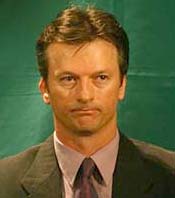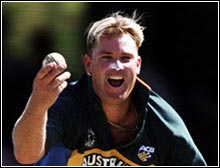Ponting is the right man
Daniel Laidlaw
The more one thinks about the decision of the Australian selectors to replace former captain Steve Waugh in the one-day side, the more one concludes it was a positive decision.
Damaging the position of the selectors, of whom Allan Border and David Boon were senior team-mates of Waugh's, is the apparent confusion of some commentators over the reasons for his sacking. Specifically, the perception that it was purely a reaction to Waugh’s performances in the recent one-day series and his failure to lead the time to the finals of that competition.
Here, one must give the selectors some credit. Though they have said there are now players who deserve to be considered ahead of Waugh, chairman Trevor Hohns also emphasised that it was a move made with next year’s World Cup in mind.
"Now was the appropriate time to do some serious planning for the World Cup," Hohns stated.
Hohns and his fellow-panel members deserve the benefit of the doubt that they have made an astute judgement primarily in consideration of the future, and were not over-reacting to a rare failure.
 Taking a critical and forward-looking view of Waugh’s one-day credentials, one could say he is a steady rather than dynamic batsman (career strike rate 75.91), is not athletic between the wickets or in the field by modern standards, and bats at No. 5 without contributing as a legitimate bowling option any more due to injury history and age. Captaincy aside, those bare characteristics do not make a particularly attractive option, especially since all-rounders are so essential now, and the selectors are supposed to pick their best available team before electing a captain.
Taking a critical and forward-looking view of Waugh’s one-day credentials, one could say he is a steady rather than dynamic batsman (career strike rate 75.91), is not athletic between the wickets or in the field by modern standards, and bats at No. 5 without contributing as a legitimate bowling option any more due to injury history and age. Captaincy aside, those bare characteristics do not make a particularly attractive option, especially since all-rounders are so essential now, and the selectors are supposed to pick their best available team before electing a captain.
On those grounds, it has been decided Waugh’s place can no longer be justified. But even considering that, it is still not necessarily a judgement based on the present, but rather on what is likely to be the case heading into the World Cup when Waugh is 37. One cannot deny the possibility of a deterioration in form and fitness over that time, which would leave Australia needlessly unsettled if led by an inexperienced skipper with the World Cup imminent. It all adds up to a harsh but brutally logical verdict.
Unquestionably, Waugh is owed loyalty and belief, and the flip side is that his captaincy is unlikely to be fully replaced by Ponting, who was not a standout candidate. It is not as if Waugh’s one-day performances have slipped by any appreciable margin, either. On the contrary, the last year has seen him average 40.61. Yet even when star veterans are performing, there comes a certain point when even the great ones must make way lest the next generation be denied an opportunity and then fail to adapt when relied upon to carry the burden of performance. Unfortunately for Waugh, it is better for the team that the selectors act too soon rather than too late.
Bitterness about the timing and manner of his deposing is unfounded. Yes, it occurred on the same day as Australia’s gala awards night (which Waugh must have suffered through with some bitterness, especially in light of Allan Border medallist Matt Hayden’s tribute to him), yet he still had to be told sometime. Better then than in the middle of packing his bags for South Africa or, even worse, when the ODI side is announced ahead of or during the first Test.
Just because a replacement was not immediately named did not make it a poorer decision, either. Nor should it be considered unfair that Waugh received no indication of his pending demise. Surely it would have only added to the stresses of the campaign had he been given warning prior to the one-day series that he had an axe dangling above his head. No, the selectors handled the announcement as well as they could for an outstanding servant of Australian cricket, as there have certainly been other far less dignified dismissals of Australian captains.
It is important to remember that Waugh benefited from a similar judgement on predecessor Mark Taylor four years ago. By removing Taylor from the one-day team but retaining him as Test skipper, the selectors allowed Waugh to gain what one assumes was valuable international captaincy experience before he was also given the Test job a little over 12 months later. Now, Waugh is experiencing the opposite end of that evolutionary process, as Ponting will be given the same opportunity to get experience. In this regard, the questionable practice of staggering the Test and one-day captaincy does make some sense.
The other erroneous complaint about Waugh’s demise is that he has been the only one singled out while others have escaped for performing worse and more often, most notably his brother. At least one more sacking is imminent.
"We haven't picked the remainder of the squad for the one-day series," chairman of selectors Trevor Hohns was ominously quoted as saying. "To say only one player is a little bit unfair at this stage." Goodbye, Junior, and thanks for all the runs.
 More shocking yet would be the omission of Shane Warne. Warne, who claimed only 6 wickets at 54 in the one-day series, could also be axed if the selectors want to hasten the development of fresh spinning talent and also prolong his Test career. Now that he has been overlooked for the captaincy, it is a possibility that cannot be ruled out if the selectors truly are intent upon selecting a rejuvenated team.
More shocking yet would be the omission of Shane Warne. Warne, who claimed only 6 wickets at 54 in the one-day series, could also be axed if the selectors want to hasten the development of fresh spinning talent and also prolong his Test career. Now that he has been overlooked for the captaincy, it is a possibility that cannot be ruled out if the selectors truly are intent upon selecting a rejuvenated team.
Though he was third-favourite in the eyes of many behind Gilchrist and Warne, the appointment of 27-year-old Tasmanian Ricky ‘Punter’ Ponting as Australia’s new ODI captain is ideal when all factors are considered.
Warne’s elevation to the vice-captaincy when Gilchrist missed a game recently was taken as an indication that might have been back in favour, and he would have made an enthusiastic if hardly cerebral leader, but he is still 32 and with a limited future. How much he could have handled all the off-field aspects, including management of his players, was also highly questionable and it is a relief that he has been overlooked.
Awarding the captaincy to Ponting is still somewhat of a gamble, but one with a significant payoff. If Ponting is considered a potential Test captain, then being allowed to find his feet in the one-day game first, like Waugh before him, should prove enormously beneficial. This honour will be the ultimate test of his maturity and capacity as a leader but with Ponting – unlike the other strong contender, Gilchrist – there is little to lose. If he is unable to rise to the challenge over the course of Australia’ s next 10 ODIs in South Africa and Zimbabwe, the selectors could always fall back on Gilchrist without too much disturbance.
While Gilchrist would undoubtedly have proven a fine diplomat and media-friendly face, as well as a capable leader who would have continued the Waugh philosophy, there existed the realistic danger that his specialist duties might have suffered. This would be especially true in the one-day game, where leading, keeping wicket and then returning to open the batting could prove too much over the course of time.
For Australia to defend its World Cup title, which after all was the primary reason for ousting Waugh in the first place, it would rather not risk sacrificing any of Gilchrist’s explosiveness as an opener or proficiency as a keeper. It was touted in the press that he could have been lowered back down the order to reduce the burden, and his returns opening the batting have diminished of late anyway, but then Australia would have had to find another opener to partner Hayden. Gilchrist remains an ideal vice-captain.
Though there are more doubts over Ponting, at least captaincy should not affect his batting. If anything, the increased responsibility could help cure his inconsistency. He is young, wants the position, and will continue in the Waugh mould while previously hinting he will also bring his own ideas to the role. There is concern over whether he is mature enough to cope with the off-field responsibilities, but this is the only sure way to find out. Should he fail, it probably would not be as destabilising to revert to Gilchrist, who has already led in two Tests, as it would have been to switch from Warne to someone else.
Despite playing it down, Warne would love to add the Australian captaincy to his imposing resume before he retires. But for all his ability as a leg-spinner, it is questionable whether Warne has the type of character and skills to be true leader in all respects, as the Australian captaincy demands, which thankfully the selectors realised. It is not as if Warne has improved his behaviour over the course of his distinguished career, because in his eyes he has never actually done anything wrong. At least Ponting has confessed to his sins.
Still developing and hopefully still maturing, Ponting is the right man. In removing Waugh and naming Ponting as his replacement, the selectors have twice boldly done the unexpected. On both counts, they got it right. All that remains to be seen now is just what kind of one-day team Ponting is set to lead.
More Columns
Mail Daniel Laidlaw